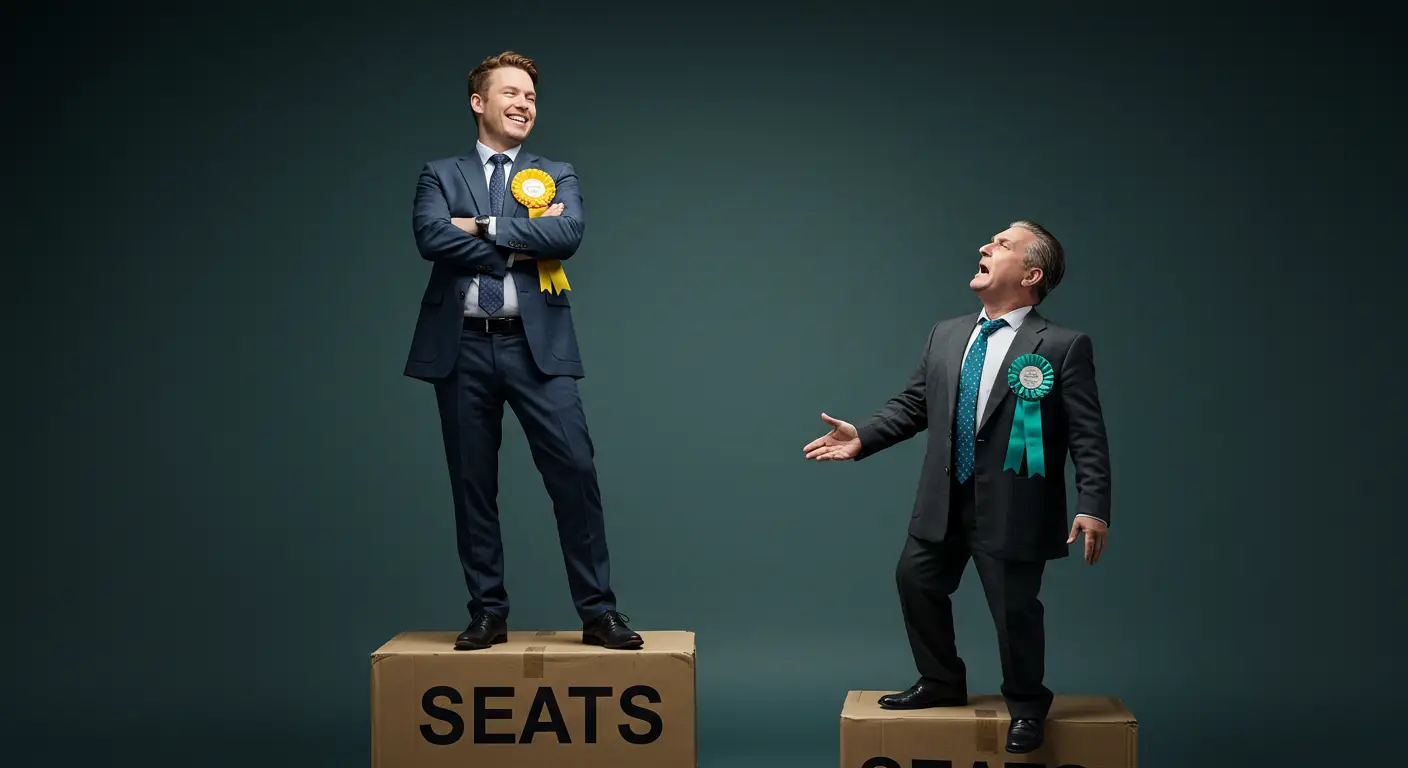I was taught in school that Proportional Representation (PR) was the reason the Nazis got into power—but turns out that’s not quite true. The myth is pretty easy to bust: Germany went back to a PR system after WWII, and it’s been running smoothly ever since. In fact, PR has given Germany over 60 years of stable coalition governments, and they’ve had fewer Chancellors since 1945 than we’ve had Prime Ministers here in the UK. So, maybe it’s time to rethink what we know about PR!
Any UK reader will be aware that our elections are based on the First Past the Post (FPTP) system. Surprisingly 40% were not bothered at the last election one way or another. Why is that? Come election day, it’s a bit like playing political roulette. You’re handed a ballot paper listing all the candidates vying to represent your area—one MP, one winner. Each party fields just one hopeful, so no picking and mixing here.
Come election day it’s a bit like playing political roulette.
You’re supposed to put an X next to your top pick, but what if they’re a long shot? Some voters play the game strategically, backing a second favourite who’s more likely to come out on top, rather than wasting their vote on a lost cause.
What is the rub? If your party’s candidate makes you groan, you’ve got two choices: vote for a candidate you dislike but with the right rosette or pick someone from another party and hope they don’t make things worse. Politics, eh? It’s like speed dating but with way more consequences past the first date. The thing is, the process pushes us all into tribal voting, or not voting, except for, what are I think disparagingly termed, “floating voters,” that is: someone who does not always stick with the same political party. That’s actually what a large proportion of people are.
“…turnout was very low, as more and more of the possible electorate become dissatisfied with two things: lack of representation and lack of choice.”
In the last UK General Election, the turnout was very low, as more and more of the possible electorate become dissatisfied with two things: lack of representation and lack of choice.
The turnout for the 2024 general election was 59.7%, marking the lowest level for a general election since 2001. This figure represents a decrease of 7.6 percentage points compared to the turnout in 2019. The drop is the most significant decline in voter participation between two consecutive elections since the period between 1997 and 2001.
Contrast this with Australia who have a preferential voting system, which means you don’t just pick one favourite—you’ve got to rank all the candidates for the House of Representatives. For the Senate, you’ve got to show a preference to a set number of candidates too. When the votes are counted, they shuffle them around based on everyone’s rankings until someone hits the magic number for a majority.
Here’s the deal with voting in Oz: it’s mandatory for all inhabitants of the Land of the Long Weekend over 18. If you skip it, then the Australian Electoral Commission slaps you with a $20 fine. Ignore that, and you’ll end up in court where the penalty jumps to $222, plus extra court costs. Long story short? Aussies don’t ghost election day!!! Result?
In Australia’s 2022 federal election, a total of 17,228,900 citizens were registered to vote, with an impressive turnout of 89.71%. The UK hasn’t come close to cracking the 80% voter turnout mark in a General Election for over 70 years—the last time was way back in 1950 and 1951.
When it comes to voter enthusiasm, we’re trailing behind several European countries. At the top of the leaderboard are Luxembourg with an impressive 89.7%, followed by Belgium, Malta, Sweden, Denmark, the Netherlands, Germany, Austria, Spain, Slovenia, Hungary, and Finland at 68.7%. We’ve got some catching up to do! The UK’s devolved government’s electoral turnout percentages are worse.
The effect in the 2024 UK general election held on Thursday, July 4, makes for stark reading. Voting took place across 650 constituencies: 543 in England, 57 in Scotland, 32 in Wales, and 18 in Northern Ireland.
The 2024 election introduced new constituency boundaries across the UK. While 65 seats remained unchanged (four with new names), the other 585 had at least some boundary changes.
Labour, led by a guy whose dad was apparently a toolmaker, came out on top, winning 411 seats with just 34% of the vote. This was a whole a 1.6 percentage point increase from 2019, but it marked the lowest vote share ever for a party forming a post-war majority government.
Labour, led by a guy whose dad was apparently a toolmaker, came out on top, winning 411 seats with just 34% of the vote.
At the lower end of the turnout distribution, almost all seats were won by Labour and were mainly seats held rather than gained. The lowest turnout in a seat won by the Conservatives was 54.8%, nearly 15 percentage points higher than the lowest turnout in a seat won by Labour.
So, what’s the answer? I believe it’s twofold: Make voting compulsory like Australia, and at the same time give the electorate more choice on the ballot paper with a preferential voting system.
In the “Elections (proportional representation): Ten Minute Rule Motion, Division 52”: held on 3 December 2024 at 14:51 the votes cast were: 138 Ayes 136 Noes. Of the Noes were 78 Conservatives (57% of the naysayers and 65% of the party) and unsurprising with a party name like Conservative. If you are wondering, only one Reform Party MP voted against PR and one recorded no vote (a surprising abstention) which is still only 60% of the party. Unsurprisingly 100% of Lib Dems MP’s voted for electoral Reform.
One other worry I have about PR is coalitions!
One other worry I have about PR is coalitions! My unfounded worry comes from a series of self-education books called “Fred learns…”, my copy being “Fred learns book-keeping” from 1978 when I studied the subject at Night School. The premise of these books is that they are all set in the “state of mind”/ country in which all topics are positioned. That is “Fredland”. A foreword in each book details this imaginary country, its people, cities, general features, industry, currency, and exports, with a section on the “current political situation”. It outlines that: “The Fredlaw is dominated by two parties – the Practical Party and the Theoretical Party. The distinguishing political principles whether it is better to get things done albeit the wrong things (the Practical Party) or to know the right things to do but never, in fact, do them (the Theoretical Party). The scenario describes last election in Fredland there was a dead heat. In the resulting coalition the Practical Party were able to put forward a program of wrong policies but the Theoretical Party were able to ensure that nothing was done. Would that happen in the UK under PR? In the UK there have been eight coalitions caused by hung parliaments since 1900, and those occurred within the FPTP system, furthermore two of them were since 2010. Also coalitions are the norm in Europe where PR is more prominent. So why worry? Wouldn’t PR give Reform a chance to enter parliament in greater numbers and possibly form a government or lead a coalition that more accurately reflected the electorate?
It’s way past time we “Reformed” the electoral system in the UK.
What do you think?







